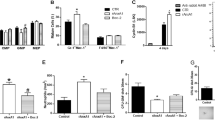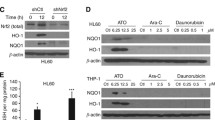Abstract
cAMP-dependent signal transduction co-operates with retinoids to induce acute promyelocytic leukaemia (APL) cell maturation. The rationale of this work was to determine whether signal cross-talk could be used to decrease the pharmacological doses of retinoids in the treatment of APL. When only the basal level of adenylate-cyclase (AC) activity is present in NB4 cells, up to 1 μM concentration of all-trans retinoic acid (RA) is required for full maturation (100%). In these conditions, with only 10 nM RA less than 20% of cells will differentiate. Although the use of membrane receptor agonists to activate AC has been proved to synergize with RA treatment, these agents were never as potent as cell permeant cAMP analogues. Analogues have disadvantages since cleavage by serum and cellular phosphodiesterases generates metabolites which interfere in cellular response. In the present study, we observed cell maturation by engrafting an autonomous Bordetella pertussis AC which steadily delivers natural cAMP into the cell. The enzyme alone had no effect on cell maturation. Importantly, cell maturation was increased in a dose-dependent manner when the bacterial AC (1 ng/ml to 1 μg/ml) was used to potentiate the effects of low doses RA (10 nM). More than 50% of cells matured with only 10 nM of RA and 200 ng/ml of B. pertussis AC. The maturation response was significantly increased when lower amounts of enzyme were repetitively added to the culture to compensate for enzymatic decay. These results indicate that a sustained AC activity enhanced cell maturation. We were able to reduce to 3 nM the RA requirement, provided that a minimal amount (20 ng/ml) of B. pertussis AC was added every 12 h in culture. Membrane signalling maintaining high the level of cAMP substantially improved the efficacy of APL cell maturation by retinoids. Therefore, therapeutic benefits are expected by lowering the concentration of RA towards physiological (nanomolar) levels, thus reducing the side-effects of the drug. cAMP-elevating drugs that act on a post-cyclase target (cyclic-nucleotide phosphodiesterases) or cell-targeted drug carriers (cAMP and RA loaded liposomes) should be evaluated as maturation therapies combining the activation of multiple signalling pathways.
Similar content being viewed by others
Author information
Authors and Affiliations
Rights and permissions
About this article
Cite this article
Quenech’Du, N., Ruchaud, S., Khelef, N. et al. A sustained increase in the endogenous level of cAMP reduces the retinoid concentration required for APL cell maturation to near physiological levels. Leukemia 12, 1829–1833 (1998). https://doi.org/10.1038/sj.leu.2401171
Received:
Accepted:
Published:
Issue Date:
DOI: https://doi.org/10.1038/sj.leu.2401171
- Springer Nature Limited
Keywords
This article is cited by
-
A novel network pharmacology approach for leukaemia differentiation therapy using Mogrify®
Oncogene (2022)
-
Differentiation therapy revisited
Nature Reviews Cancer (2018)
-
MicroRNA-181a-mediated downregulation of AC9 protein decreases intracellular cAMP level and inhibits ATRA-induced APL cell differentiation
Cell Death & Disease (2014)
-
Eradication of acute promyelocytic leukemia-initiating cells by PML/RARA-targeting
International Journal of Hematology (2010)
-
How patients have benefited from mouse models of acute promyelocytic leukaemia
Nature Reviews Cancer (2005)




